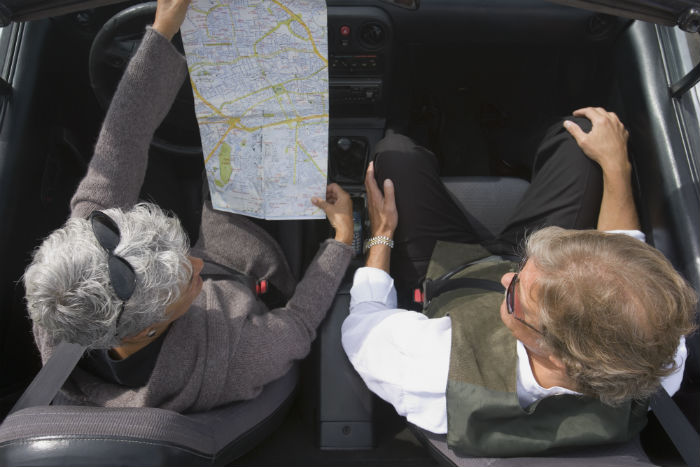You don’t have to cancel the annual family vacation just because your loved one is getting older. With some careful planning, you can still get away and have an enjoyable time. Use these tips to plan a trip with an elderly loved one.
Get Doctor Clearance
Consult with the elder’s primary care physician before booking any travel plans to discuss the following issues:
- Are the method(s) of travel and destination(s) you’ve chosen appropriate for the senior’s abilities and limitations?
- Do they need any special vaccinations?
- Can the doctor prescribe a medication or supplement to help with anxiety or other behavioral issues that might arise?
- Does the doctor have any additional suggestions or concerns that you should be prepared for?
Be sure to get prescriptions for all your loved one’s medications and fill them before you leave.
Pre-Plan Accommodations
If you’re using a car as your main mode of transportation, either to get to your destination(s) or to get around once you arrive there, consider renting a larger, more comfortable model. For example, a mini-van is a more accessible vehicle than a two-door car. If your loved one uses a wheelchair, walker or other mobility aids and medical equipment, make sure it will fit in the vehicle you choose.
If you plan to fly, request seat assignments in the rows designated for disabled travelers and arrange for assistance getting on and off the plane and navigating the airport, if necessary. If there is a meal service aboard the flight, advise the reservation system of any special dietary needs. Make sure the airline can accommodate any assistive medical equipment your loved one uses, such as a portable oxygen concentrator.
When booking hotels, request an accessible room. These rooms are generally located on the first floor and have improved accessibility features, such as wider doorways and stepless showers. Ask about additional amenities that the property may offer, like shower chairs for easy bathing and alarm clocks and telephones for deaf and hard of hearing individuals.
Scale Back
Be realistic about the amount of activity, walking and traveling your loved one is capable of. Keep your plans flexible to accommodate how they are feeling each day. If your loved one has limited mobility, renting a one-story lake-front cottage within driving distance of home will be more enjoyable than a whirlwind jaunt overseas or a trip to a large park that involves a great deal of walking.
Research each destination and activity carefully to ensure it can accommodate your elder’s special needs. In addition to mobility and accessibility, be sure to take their stamina and energy levels into account. Travel and excitement can wear on everyone after a while, so allow plenty of time for rest between activities, and don’t make the trip too long overall.
Have Essentials on Hand
If your loved one does not have vascular disease and is going to be sitting in a car or on a plane for extended periods, consider buying supportive stockings to prevent blood clots and numbness in the legs. Pack light clothes that can be layered. Take basic medical information everywhere you go, in case of an emergency. This includes the doctor’s contact information, insurance information, a copy of your medical power of attorney form, and all prescription information. Other essentials to have on hand at all times are medications, snacks, incontinence supplies, if necessary, and most importantly, water. Elders can get dehydrated quickly.
Traveling with Someone Who Has Dementia
If your loved one has Alzheimer’s disease or another form of dementia, you may need to consider some additional precautions and preparations.
Stick to Their Routine
Knowing what to expect throughout the day is crucial for people with dementia. It reduces stress, anxiety and fear, but it is often difficult for them to remember new plans. Because of this, try to keep mealtimes, bedtimes and medication schedules as close to their home routine as possible. To minimize the confusion of being in a new environment, bring along a few familiar objects and parts of their routine to create a sense of home, such as a cozy blanket, their favorite scented bath products or a recording of a favorite movie or television show.
Communicate
Before and during each activity, tell your loved one where you are going and what you will be doing. Do not overload them with information, though. Complicated directions, people’s names and other extraneous details may contribute to confusion and agitation before you even get there.
Provide Sensitivity and Serenity
When planning activities, avoid very loud places and those with lots of people if your loved one does not do well with noise/crowds or is overly tired. Be very sensitive to the warning signs of anxiety and agitation. Increased confusion and irritability are usually clear indicators that a loved one is getting overwhelmed and needs a break to regroup. Try to ensure that there is a quiet place nearby where you both can rest if they get fatigued or start acting out. The solution could be as simple as sitting in the rental car in the parking lot, returning to the hotel room or finding a secluded picnic bench outside of an attraction.
Watch the Clock
Sundowner’s Syndrome can increase fear and agitation just before the sun sets. Make a point of returning to the hotel room before it gets dark. Close the curtains and turn on all the lights to minimize shadows and lessen the drastic change from day to night.

